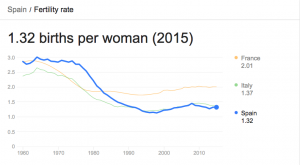They should be full of people and full of life
By Hilary White
Yes, they should be.
But it’s not likely they will.
“Across Spain there are almost 3000 abandoned villages.”
Italy is the same. As soon as you are out of the three major conurbations of Milan, Rome and Naples, you find a completely different story.
Originally a center along ancient trade routes, Civita di Bagnoregio was prosperous from Roman times through the late Middle Ages. But after a devastating earthquake in 1695, most residents fled for lower ground, and so began the city’s long decline. By the end of World War II, nearly all of its inhabitants had left in search of work in cities or abroad. For the last half century, its population has hovered around 10 or so full-time residents.
…
These rural places were once intricately tied to the countryside around them, their inhabitants working as farmers and merchants, craftsmen and shepherds. But when these towns die, it’s not just the population that suffers: so too do the unique traditions and skills associated with each place, as well as the landscape that supported them.
This is the same reason we have so little hope of rebuilding the damaged villages and churches of the Valnerina. In one little place about 15 km from Norcia where the monks used to go from time to time to say Mass, there were 32 people still in full time residence. And that was considered crowded.
Something not often admitted by anyone, even historians, was that this was done to Italy (and presumably Spain) on purpose. Since the take-over by the secularists in the 19th century the mania for “modernisation” was seen in changes to laws that eventually made it all but impossible for country people to stay in the country in their ancestral towns. Something similar was done from the 17th century onwards in England with the Enclosures and the ousting of the country people and the mass shift of whole populations into the cities at the start of the Industrial Revolution.
The destruction of the traditional (Catholic) way of life hasn’t been either an accident of history or a natural development.
~
